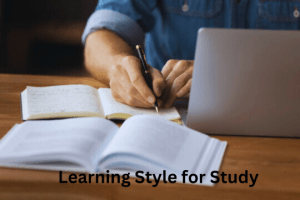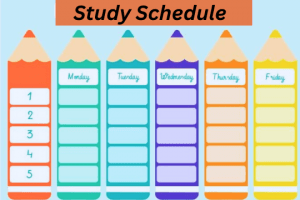In the present high speed concentrate on climate, understudies frequently end up shuffling different subjects and a huge measure of data while planning for tests. The strain to succeed and perform well can overpower. Notwithstanding, by embracing the right review methods and systems, you can improve your way of learning and accomplish improved results without wearing yourself out. In this article, we will investigate viable strategies to concentrate on more effectively significantly quicker, guaranteeing that you make the most out of your examination meetings.
Understanding Your Learning Style for Study

Understanding your learning style includes perceiving the remarkable manner by which you handle and hold data. Whether you Study best through visual guides, hear-able prompts, or involved encounters, finding your learning style helps tailor your examination methods to upgrade cognizance and memory maintenance. By recognizing whether you’re a visual, hear-able, sensation, or a mix of these student types, you can streamline your examination techniques and make your learning process more powerful and charming.
Focusing on Your Review Material
“Focusing on Your Review Material” involves the act of deciding the general significance of various subjects, points, or ideas while getting ready for tests. By perceiving which regions hold more prominent importance and apportioning your time and concentrate likewise, you can smooth out your review endeavors and guarantee that you cover the most vital substance first. This approach considers productive utilization of your exploration time and better status for assessments.
Making a Reasonable Report Timetable

“Making a Sensible Report Timetable” includes fostering a viable arrangement to deal with your review time successfully. By taking into account your everyday daily practice, energy levels, and responsibilities, you can plan a schedule that obliges centered concentrate on meetings without overpowering yourself. A very much organized research plan assists you with distributing adequate opportunity to different subjects, guarantees reliable advancement, and limits pressure, at last improving your groundwork for tests.
Using Dynamic Review and Separated Redundancy
“Using Dynamic Review and Separated Redundancy” alludes to utilizing two strong Study procedures to improve memory maintenance and cognizance. Taking part in dynamic review involves the proactive recovery of data from your memory, rather than just surveying notes latently. Separated reiteration, then again, spins around returning to materials at dynamically longer spans throughout time. By consolidating these strategies, you can build up how you might interpret key ideas, work on long haul maintenance, and streamline your exploration endeavors for better test execution.
Separating Complex Ideas
“Separating Complex Ideas” includes the procedure of analyzing multifaceted thoughts into more modest, more sensible parts. By handling each perspective in turn, you can get a handle on the subtleties all the more really and construct a strong groundwork of understanding. This strategy improves on the Study experience, forestalls overpowering sentiments, and permits you to bit by bit sort out the master plan, making testing subjects more open and fathomable.
Participating in Gathering Study Meetings

“Participating in Gathering Study Meetings” involves teaming up with friends to improve learning and appreciation. Bunch concentrate on meetings give a stage to examine and make sense of ideas, share bits of knowledge, and explain questions. This approach opens you to different perspectives and supports dynamic interest, prompting a more profound comprehension of the topic. By taking part in intuitive conversations, you can cement your insight, build up key ideas, and advantage from aggregate growth opportunities.
Limiting Interruptions and Expanding Concentration
“Limiting Interruptions and Expanding Concentration” includes establishing a climate helpful for successful Study. By taking out potential interruptions, for example, cell phones and boisterous environmental factors, you can upgrade your fixation and submerge yourself in your examination material. Cultivating an engaged air permits you to connect profoundly with the substance, prompting further developed understanding and maintenance. This training is fundamental for useful examination meetings that yield improved brings about less time.
Enjoying Reprieves for Ideal Maintenance
“Enjoying Reprieves for Ideal Maintenance” underlines the significance of integrating ordinary breaks into your review schedule. Breaks forestall mental weakness and assist with keeping up with data assimilation. By following methods like the Pomodoro Strategy (short exploration spans followed by brief breaks), you can improve your mental presentation and Study style. These stops permit your cerebrum to handle data, upgrading memory solidification and in general maintenance, at last prompting more viable and productive review meetings.
Consolidating Visual Guides and Psyche Planning
“Consolidating Visual Guides and Psyche Planning” includes using visual apparatuses to upgrade learning and Study. Visual guides, like outlines, graphs, and pictures, assist with working on complex ideas and further develop memory maintenance. Mind planning, then again, includes making interconnected visual portrayals of thoughts, working with better comprehension and review. By consolidating these strategies, you can draw in both your visual and mental resources, making your exploration meetings really captivating, powerful, and effective.
Solid Way of life for Further developed Concentration
“Solid Way of life Propensities for Further developed Concentration” centers around embracing rehearses that emphatically influence your mental capacities during concentrate on meetings. Ordinary activity, a reasonable eating routine, and remaining hydrated add to further developed cerebrum capability and supported focus. These solid propensities give the fundamental energy and mental lucidity to connect profoundly with your exploration material, upgrading your capacity to center, comprehend, and hold data productively for better scholastic execution.
Practice with Past Papers and Mock Tests

“Practice with Past Papers and Mock Tests” includes the essential utilization of past test papers for more Study and reenacted tests to upgrade test readiness. By managing past papers and false tests, you come out as comfortable with the test design, question types, and using time productively. This training distinguishes your assets and shortcomings, permitting you to zero in on regions that need improvement. Ordinary practice under test like circumstances fabricates certainty, refines your critical thinking abilities, and guarantees you’re completely ready to handle the genuine test with capability.
Remaining Positive and Overseeing Pressure
“Remaining Positive and Overseeing Pressure” highlights the meaning of keeping a positive mentality while exploring the difficulties of test readiness. By developing positive thinking and self-conviction, you can lessen nervousness and improve your capacity to really assimilate data. Utilizing pressure the board strategies like profound breathing, contemplation, and care keeps up with close to home equilibrium, permitting you to move toward your examinations with a reasonable and centered mind. An uplifting outlook adds to better learning results and a smoother test experience by and large.
Getting Sufficient Rest Before the Test
“Getting Sufficient Rest Before the Test” accentuates the significance of focusing on soothing rest as a vital piece of compelling test readiness. Satisfactory rest is fundamental for memory combination, mental capability, and generally speaking prosperity. Rather than forfeiting rest for last-minute packing, center around evaluating central issues and getting an entire night’s rest. This guarantees that your psyche is revived and alert on test day, improving your capacity to review data and perform at your best during the test.
Somewhat late Update Tips
“Somewhat late Update Tips” gives direction to successfully checking on your review material in the last stages before a test. Instead of endeavoring to learn new points, focus on inspecting summed up notes and key ideas. Remain sure about the information you’ve proactively acquired. Keep a positive outlook, oversee pressure through unwinding methods, and guarantee you get a decent night’s rest. These tips guarantee that you approach the test with a reasonable brain and a strong groundwork, expanding your odds of coming out on top.
Conclusion
Concentrating actually is tied in with creating an effective strategy, then follow through. By understanding your Study style, arranging your review material, and utilizing demonstrated procedures like dynamic review and separated reiteration, you can improve your review meetings and accomplish improved brings about less time. Keep in mind, consistency is vital. Thus, execute these techniques early and receive the benefits during your tests.
FAQs
Might I at any point read up for tests in a solitary long meeting?
It’s more successful to break your review time into more limited, centered meetings. This approach improves maintenance and decreases mental weakness.
How would I defeat delaying during concentrate on meetings?
Begin with a little errand to gather speed. Use procedures like the Pomodoro Method to deal with your review time in spans.
Is bunch concentrating on better compared to concentrating alone?
Bunch review can be valuable as it opens you to alternate points of view and permits you to test your comprehension by clarifying ideas for other people.
Would it be a good idea for me to forfeit rest to concentrate on more?
No, rest is vital for memory union. Forfeiting rest can prompt decreased mental capability and block your test execution.
How would I remain cool-headed previously and during tests?
Practice profound breathing, care, and positive self-talk. Recall that feeling ready and certain emphatically impacts your presentation.